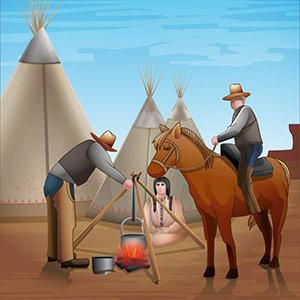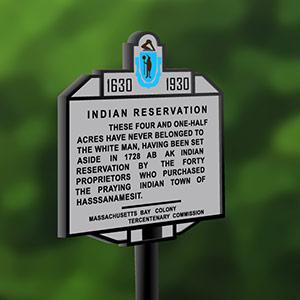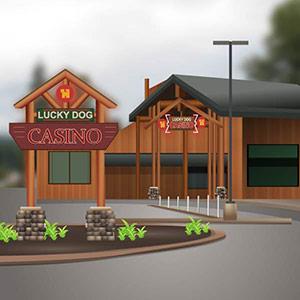[ad_1]
At one time, the one strategy to legally gamble was to take a
Vegas highway journey or cruise over to Atlantic Metropolis to attempt your luck. Within the final
few many years, Indian gaming (tribal casinos) have been popping up everywhere in the
panorama in virtually each U.S. state. However how did the multi-billion greenback
gaming trade unfold from The Strip to the reservation?
A Temporary Historical past of Indian Reservations

Within the late 1800s, the remaining Native American tribes have been
moved (typically towards their will) to land put aside for them by the federal
authorities. These ‘Indian reservations’ have been a type of settlement with the
Native American tribes, whereby they might allegedly be ‘left in peace’ to
pursue their methods of life. Nonetheless, because the European lifestyle decimated
Native American methods, these sparse lands have been a minor Band-Support utilized to a
main wound.
The one manner a reservation system would work was for the
federal authorities to arrange and set up reservations throughout the house
territories of every tribe. Since federal authority is larger than state
authority on nationwide issues and Constitutional rights, all Indian
reservations in all 50 states are designated as federal land. And with the land
comes sure sovereign rights for the Native American inhabitants. Nonetheless,
for the tribal nations to be really sovereign, they would want to have the correct
to self-government, which is clearly not the case. When the rights of
particular person states, reservations, and federal regulation conflict, the Supreme Court docket typically
steps in to settle issues.
Sovereign Tribal Territories

The difficulty with any type of segregation is that it by no means
works, and all the time creates ghettos and pockets of poverty-stricken individuals who
stay exterior of society’s benefits. With the intention to respect the cultural
integrity of varied tribes, the federal authorities granted them restricted sovereignty
on their own reservations. This meant that no state authority might
regulate the reservations or in any other case govern them. Since a lot of the tribal
reservations are positioned in distant lands away from massive metropolis economies, tribal poverty
elevated. Native Individuals stay essentially the most impoverished and underprivileged
minority group in the USA.
However a loophole within the regulation modified the future of many Native
Individuals: they don’t seem to be restricted or sure by state regulation. That signifies that if a
state bans playing (as most of them do), they can not ban playing on sovereign
tribal land, because it technically doesn’t belong to the state. It took a number of
years within the court docket system for Indian gaming to ascertain itself, nevertheless it all
began with one case.
Bryan v. Itasca County

Within the Nineteen Seventies, a married Chippewa Indian couple named Russell
and Helen Bryan lived in a cell house positioned on an Indian reservation in
Minnesota. In the future they acquired a property tax invoice from Itasca County. Since
that they had by no means acquired a property tax invoice earlier than, they sought authorized recommendation
and finally went to court docket, refusing to pay the illegal tax. The Bryans misplaced
their court docket case in each the state district court docket and Minnesota Supreme Court docket.
However once they introduced their case to the USA Supreme Court docket, issues received
fascinating.
Underneath federal authority, the USA Supreme Court docket
decides crucial issues affecting the lives of the individuals of the
United States. Vital choices made on this stage have sweeping
implications for all concerned, and sometimes change earlier interpretations of
Constitutional regulation. Within the landmark case of Bryan v. Itasca
County, Supreme Court docket Justice Brennan dominated in favor of the Bryans, and in
so doing, modified the destiny of many tribes ceaselessly. The ruling states that not
solely does a U.S. state have completely no rights to impose taxes on people
residing on Indian reservations, they can not regulate any habits or choices
made on these reservations both. From that one case, the stage was set for
the primary tribal casinos.
The Seminole Tribe of Florida
Within the 70s, not lengthy after the ground-breaking Bryan case,
the Seminole Tribe of Florida arrange a high-stakes bingo corridor on their
reservation land exterior of Fort Lauderdale. The native sheriff threatened
arrests if the tribe opened the bingo corridor. The Seminole Tribe sought—and
acquired—authorized safety from the courts. After a number of district court docket instances,
the Seminoles have been allowed to proceed their bingo operations primarily based on the
ruling within the Bryan case. Quickly the Seminoles opened further bingo halls, and
finally expanded into full-fledged casinos, and finally, the possession of
one of many world’s most acknowledged manufacturers, the Exhausting Rock Café.
Tribal On line casino Enlargement

The tribal gaming controversy got here to a head when police
shut down playing halls and arrested members of the Cabazon Band of Mission
Indians close to Indio, California. The tribe sued and received their case, and have been
allowed to proceed their gaming operations. Ongoing clashes between native
authorities and numerous tribes led to Congressional motion. In 1988, Congress
handed the Indian Gaming Regulatory Act (IGRA), signed by President Ronald
Reagan. This furthered the facility of tribes to open casino-like halls and broaden
their gaming actions, in a bid to scale back federal support to reservations and
encourage financial self-sufficiency. The regulation got here with a worth, although. The
federal authorities would have final authority over regulating the gaming
actions of the tribe.
The IGRA allowed the tribes to maintain their sovereignty, however
allowed a form of blended sovereignty with the federal authorities when it
particularly entails playing. The largest purpose for this was to permit for
the regulation of tribal gaming for financial growth, and to guard towards
unfavorable influences like organized crime. To ensure that tribal casinos to broaden
additional, numerous acts and legal guidelines have been handed to permit for a rise in
gaming actions, from easy bingo halls to full-blown casinos. However the
battle for the expansion of tribal gaming has been met with a lot opposition.
Particular person states have argued towards the unfavorable results of playing on
communities—on and off reservations. Additionally, the growing revenues of tribal casinos
has began to fret the large boys in Vegas, Atlantic Metropolis, and elsewhere. They
don’t need the competitors.
House owners of conventional casinos, most notably former-casino
mogul Donald Trump, have loudly acknowledged publicly that tribal casinos are overrun
by organized crime. The FBI has refuted these claims, stating that they’ve
seen no proof of organized crime involvement in tribal gaming. Further
opposition comes within the type of state authorized motion towards several types of
on line casino growth. Because the tribal casinos expanded, the income generated allowed
tribes to buy further land by which to broaden. Many states proceed to battle
over the rights of tribes to purchase state land for playing functions.
Results of Tribal Gaming on Native American Communities
As of 2011, there have been 460 playing operations run by 240
tribes with a complete annual income of $27 billion. And this quantity continues to
develop as new tribal casinos open frequently. The quantity of tribal land
isn’t distributed evenly, so some states have bigger quantities of reservation
land upon which to construct. Oklahoma has 113 tribal casinos, greater than every other
state within the U.S. Nonetheless, there are 562 federally acknowledged tribes within the
United States, a lot of which have chosen to not run casinos.
Casinos prosper when positioned close to main financial facilities,
which is why California is house to a number of the largest tribal casinos. The
largest on line casino within the state of California is the Pechanga Resort and On line casino in
Temecula, with over 3,000 slot machines and 200,000 sq. ft of gaming house.
Of the $27
billion generated by tribal gaming, the most important quantities got here from
Sacramento, with virtually $7 billion, and Washington State with $6.7 billion. The
largest casinos within the U.S. (by gaming house, not procuring or leisure)
are owned by Native American tribes. The most important on line casino within the U.S. is the WinStar
World On line casino and Resort (519,000 Sq. ft) in Thackerville, Oklahoma. It’s
owned by the Chickasaw Nation. The second largest U.S. on line casino is the 314,000-square-foot
Foxwoods Resort On line casino, with 7,200 slot machines and 380 desk video games. Foxwoods
is owned by the Mashantucket Pequot Tribe.
However as is the case in any massive enterprise, a lot of the wealth
is hoarded by these on the highest. The consequences of tribal gaming on Native American
people isn’t fast, and never all the time optimistic. Whereas lots of the extra
worthwhile tribal casinos supplied a rise in jobs and modifications in tribal
infrastructure (higher faculties, cultural facilities, and so on.), that isn’t the norm
in each case. It might take a number of generations for the financial success of U.S.
tribal gaming to be shared with the typical Native American—if in any respect.
Within the meantime, tribal casinos have turn into a
main pressure to be reckoned with, and their financial success proves that casinos
are an enormous enterprise, whether or not on the dazzling Las Vegas Strip, or on a tribal reservation
in Oklahoma.
[ad_2]
Source link


